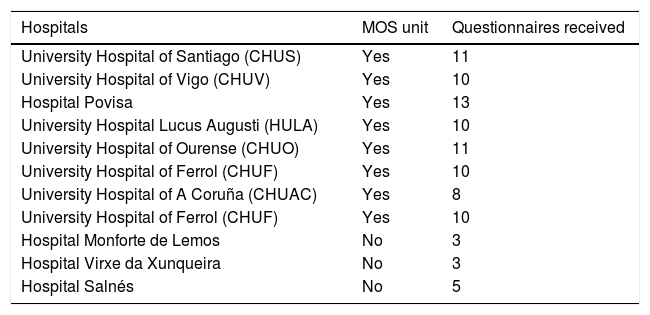To evaluate the preference in the anaesthetic technique by anaesthesiologists for the management of inguinal hernia surgery in Galicia.
Material and methodsUsing the National Catalogue of Hospitals of the Ministry of Health and Consumer Affairs in Galicia, a questionnaire was sent to the Heads of Anaesthesiology Service and Coordinators of the Postanaesthesia Care Unit (PACU) with 11 questions on the anaesthetic technique chosen by anaesthesiologists in the management of patients for inguinal hernia surgery, as well as their reasons.
ResultsThe questionnaire was sent to 11 hospitals: 8 with PACU and 3 District. A total of 94 professionals responded, 56% with more than 10 years of experience, who performed between 8 and 10 procedures/month (58%) on an outpatient basis (61.54%). The most used anaesthetic technique was intradural in 52.8%, compared to 41.8% of general anaesthesia. Respondents with more than 10 years of experience preferred spinal anaesthesia in 38.6% of cases, compared to those with less experience (6.8%) (p=.037). One in 4 of those who chose general anaesthesia used ultrasound-guided interfascial blocks (27.5%). The local anaesthetic most used in intradural anaesthesia was hyperbaric bupivacaine (70.8%) at doses higher than 7mg.
ConclusionIntradural anaesthesia with hyperbaric bupivacaine was the technique most chosen by anaesthesiologists for the management of inguinal hernia surgery. The anaesthetic techniques chosen among the different hospitals did not follow a homogenous distribution. In this survey, there was a tendency to choose the technique associated with the experience of the anaesthesiologist.
Evaluar la preferencia en la técnica anestésica de los anestesiólogos para el manejo de la cirugía de hernia inguinal en Galicia.
Material y métodosA partir del Catálogo Nacional de Hospitales del Ministerio de Sanidad y Consumo, en Galicia, se remitió a los jefes de servicio de Anestesiología y coordinadores de las unidades de Cirugía Mayor Ambulatoria (CMA) una encuesta con 11 preguntas sobre la técnica anestésica elegida por los anestesiólogos en el manejo de los pacientes para cirugía de hernia inguinal, así como sus motivos.
ResultadosLa encuesta se envió a 11 hospitales: 8 con unidades de CMA y 3 comarcales. Contestaron 94 profesionales, un 56% con más de 10años de experiencia, que realizaban entre 8-10 procedimientos/mes (58%) en régimen ambulatorio (61,54%). La técnica anestésica más empleada fue la intradural en un 52,8%, frente a un 41,8% de la anestesia general. Los encuestados con más de 10años de experiencia prefirieron la anestesia raquídea en un 38,6% de los casos frente a los de menor experiencia (6,8%) (p=0,037). Uno de cada 4 que eligieron la anestesia general empleó bloqueos interfasciales guiados por ultrasonidos (27,5%). El anestésico local más empleado en la anestesia intradural fue la bupivacaína hiperbara (70,8%) a dosis superiores a 7mg.
ConclusiónLa anestesia intradural con bupivacaína hiperbara representó la técnica más elegida por los anestesiólogos para el manejo de la cirugía de hernia inguinal. Las técnicas anestésicas escogidas entre los diferentes hospitales no siguieron una distribución homogénea. En la encuesta presentada se mostró una tendencia a la elección de la técnica asociada a la experiencia del anestesiólogo.










